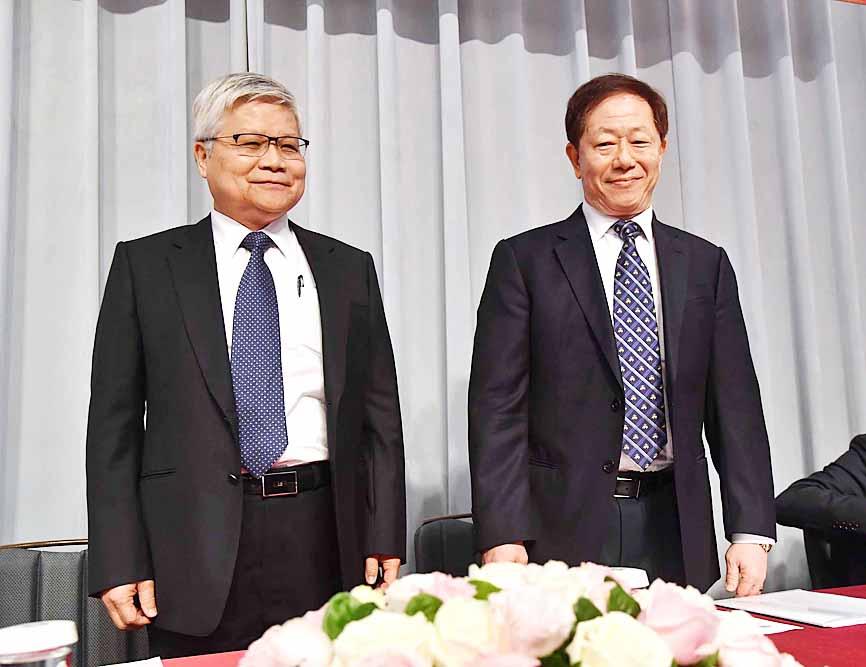Taiwan Semiconductor Manufacturing Co (TSMC, 台積電) chairman Mark Liu (劉德音) and chief executive officer C.C. Wei (魏哲家) each received about NT$422 million (US$14.89 million) in compensation last year, when the contract chipmaker’s net profit smashed records.
Liu’s and Wei’s pay rose NT$129 million, or 44 percent, from a year earlier, as the chipmaker reported a nearly 50 percent year-on-year increase in net income to NT$517.89 billion last year, TSMC said in its annual report.
Earnings per share were NT$19.97, a significant increase from NT$13.32 a year earlier, as the company benefited from global demand for its high-end 5-nanometer and 7-nanometer process chips used in emerging technologies such as 5G applications, high-performance computing devices and the Internet of Things.

Photo: CNA
Consolidated sales for last year also reached a record NT$1.34 trillion, up from NT$1.07 trillion a year earlier. In US dollar terms, sales rose 31.4 percent from a year earlier, beating the average growth of 10 percent in the global semiconductor industry.
The company shipped 12.4 million 12-inch-equivalent wafers, up from 10.1 million units in 2019, while sales of chips made using a 16-nanometer process and more advanced technologies, including the 5 and 7-nanometer processes, accounted for 58 percent of the company’s total sales, up from 50 percent a year earlier, the annual report showed.
Last year, the company provided 281 different production technologies to its 510 customers and rolled out 11,617 products, it said.
The company accounted for 24 percent of total production value in the global semiconductor industry, excluding the memorychip segment, up from 21 percent in 2019, it said.
In the report, Liu and Wei thanked shareholders for their support and trust in the company.
Several other TSMC executives received annual compensation topping NT$100 million last year, the report showed.
These executives included senior vice president of Europe and Asia sales Lora Ho (何麗梅), senior vice president of operations Y.P. Chin (秦永沛), senior vice president of research and development Y.J. Mii (米玉傑), senior vice president of information technology, materials and risk management J.K. Lin (林錦坤) and senior vice president of research and development Lo Wei-jen (羅唯仁).
Chief financial officer Wendell Huang (黃仁昭), senior vice president of corporate planning J.K. Wang (王建光), senior vice president of Europe and Asia sales and corporate research under research and development Cliff Hou (侯永清), senior vice president of business development Kevin Zhang (張曉強) and vice president and general counsel Sylvia Fang (方淑華) each received compensation of NT$50 million to NT$100 million, TSMC said.

Taiwan’s rapidly aging population is fueling a sharp increase in homes occupied solely by elderly people, a trend that is reshaping the nation’s housing market and social fabric, real-estate brokers said yesterday. About 850,000 residences were occupied by elderly people in the first quarter, including 655,000 that housed only one resident, the Ministry of the Interior said. The figures have nearly doubled from a decade earlier, Great Home Realty Co (大家房屋) said, as people aged 65 and older now make up 20.8 percent of the population. “The so-called silver tsunami represents more than just a demographic shift — it could fundamentally redefine the

The US government on Wednesday sanctioned more than two dozen companies in China, Turkey and the United Arab Emirates, including offshoots of a US chip firm, accusing the businesses of providing illicit support to Iran’s military or proxies. The US Department of Commerce included two subsidiaries of US-based chip distributor Arrow Electronics Inc (艾睿電子) on its so-called entity list published on the federal register for facilitating purchases by Iran’s proxies of US tech. Arrow spokesman John Hourigan said that the subsidiaries have been operating in full compliance with US export control regulations and his company is discussing with the US Bureau of

Businesses across the global semiconductor supply chain are bracing themselves for disruptions from an escalating trade war, after China imposed curbs on rare earth mineral exports and the US responded with additional tariffs and restrictions on software sales to the Asian nation. China’s restrictions, the most targeted move yet to limit supplies of rare earth materials, represent the first major attempt by Beijing to exercise long-arm jurisdiction over foreign companies to target the semiconductor industry, threatening to stall the chips powering the artificial intelligence (AI) boom. They prompted US President Donald Trump on Friday to announce that he would impose an additional

Pegatron Corp (和碩), a key assembler of Apple Inc’s iPhones, on Thursday reported a 12.3 percent year-on-year decline in revenue for last quarter to NT$257.86 billion (US$8.44 billion), but it expects revenue to improve in the second half on traditional holiday demand. The fourth quarter is usually the peak season for its communications products, a company official said on condition of anonymity. As Apple released its new iPhone 17 series early last month, sales in the communications segment rose sequentially last month, the official said. Shipments to Apple have been stable and in line with earlier expectations, they said. Pegatron shipped 2.4 million notebook